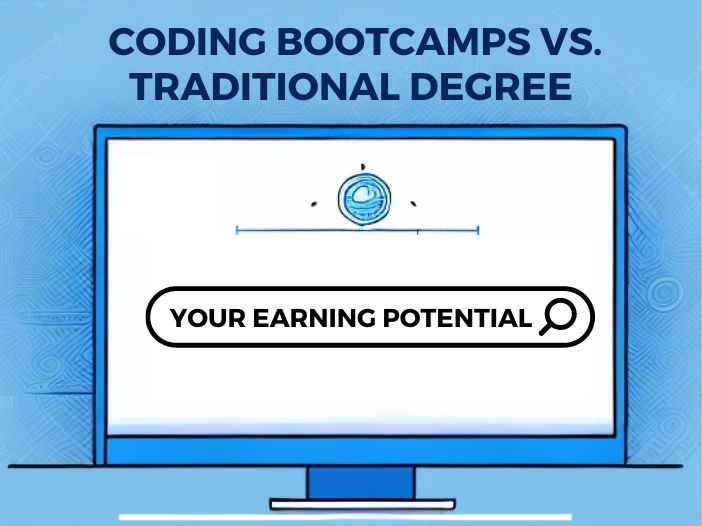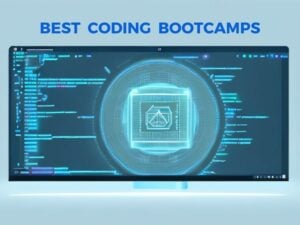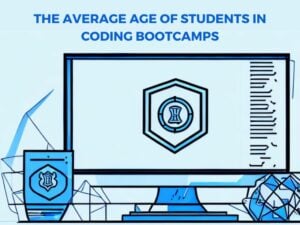Over the last few years, the popularity of coding bootcamps has exploded, leading more and more students to consider these alternative education programs over traditional computer science degrees.
While bootcamps offer a quicker path to becoming a software developer, many students wonder if the lack of a formal degree will impact their earning potential in the long run.
In this article, we’ll look at the differences between coding bootcamps and traditional degrees and analyze various factors to determine if you will make less if you go the bootcamp route.
Understanding the differences between coding bootcamps and traditional degrees
Our first step is to define exactly what we mean by coding bootcamps and traditional degrees.
Each path has unique advantages and drawbacks, which we’ll explore below.
What is a coding bootcamp?
Coding bootcamps are short-term, immersive programs that teach students how to code.
These programs usually last anywhere from three to six months.
They are designed to equip students with the technical skills necessary to land an entry-level job as a software developer.
Bootcamps often focus on specific technologies like React or Ruby on Rails and feature a combination of lectures, hands-on exercises, and projects that simulate real-world scenarios.
The immersive nature of bootcamps means that students are fully immersed in the learning process, often spending 8-10 hours per day in class and working on assignments outside of class.
This intense focus can be beneficial for students looking to quickly gain the skills they need to start a career in tech.
It is increasing in popularity among older individuals looking for a career change.
Another advantage of coding bootcamps is that they are often more affordable than traditional degrees.
Bootcamps can cost anywhere from a few thousand to tens of thousands of dollars, but they are usually significantly less expensive than a four-year degree program.
This affordability can be especially appealing for students looking to enter the tech industry without taking on significant debt.
However, it’s important to note that coding bootcamps are not for everyone.
The fast-paced, intensive nature of bootcamps can be overwhelming for some students, and the lack of a formal degree may limit career advancement opportunities down the line.
What does a traditional computer science degree entail?
A traditional computer science degree typically takes four years to complete and involves a broad range of coursework in areas like algorithms, databases, programming languages, and operating systems.
Students in traditional degree programs also study math, physics, and engineering and often have access to extensive research resources and other advanced facilities.
One of the most significant advantages of a traditional degree program is the depth and breadth of knowledge that students gain.
In addition to technical skills, students in traditional degree programs also develop critical thinking, problem-solving, and communication skills that employers highly value.
Another advantage of traditional degree programs is that they offer a more well-rounded education.
Students in traditional degree programs also take courses in the humanities, social sciences, and other areas.
This can help students develop a broader perspective and better understand the world around them.
However, traditional degree programs are often more expensive than coding bootcamps and require a significant time commitment.
Traditional degree programs may focus less on the specific technologies and skills in high demand in the tech industry.
Regardless of your chosen path, it’s important to remember that learning to code is a lifelong process.
The tech industry constantly evolves, and staying up-to-date with all the latest technologies and trends is essential for career success.
Job prospects and earning potential
Whether you attend a coding bootcamp or degree, you will earn comparative salaries soon after graduating.
The potential to earn more by attending a bootcamp is there since you will have multiple years of experience compared to the recent college graduate.
Job placement rates for coding bootcamp graduates
While coding bootcamps attract many students with the promise of job-ready skills in a short amount of time, it can be challenging to verify bootcamp graduation and job placement rates.
According to Course Report, the graduation rate for bootcamps in 2020 was around 72.5%, with a job placement rate of 81% within six months.
This is significantly better than the average college job placement rate of 69% within six months of graduation.
However, it’s worth pointing out that bootcamp graduates may need to start in lower-paying positions than traditional degree holders to gain the necessary experience and advance to higher positions.
Job placement rates for traditional degree graduates
Graduates of traditional computer science degrees usually have access to a wider range of job opportunities and can expect a higher starting salary.
According to the National Association of Colleges and Employers, the average starting salary for computer science degree holders is $68,000 in 2021.
Comparing starting salaries and long-term earning potential
According to PayScale, the average salary for coding bootcamp graduates is $63,000 annually, while traditional degree holders earn about $71,000 annually on average.
However, this gap may decrease over time as experience and skills grow.
Over the course of their careers, computer science degree holders can earn significantly more than coding bootcamp graduates, with the potential to reach six-figure salaries as they reach more senior positions.
This is not a guarantee as many factors are involved, like the size of the company, network, and location.
Comparing the costs and time investment
Tuition and fees for coding bootcamps vs. traditional degrees
Coding bootcamps are generally less expensive than traditional degrees, costing between $10,000 and $20,000 for a full program.
Traditional degrees, however, can be significantly more expensive.
According to College Board, In 2022-23, the average published (sticker) tuition and fees for full-time students are Public four-year in-state: $10,950, $190 higher than in 2021-22 (1.8% before adjusting for inflation). Public four-year out-of-state: $28,240, $620 higher than in 2021-22 (2.2% before adjusting for inflation).
Remember that these costs don’t include room and board, which can add another $10,000 to $15,000 per year, depending on the location and school.
While traditional degrees may offer more prestige and a wider range of courses, coding bootcamps are a great option for those who want to focus specifically on coding and programming.
Additionally, bootcamps are often more flexible in scheduling and can be completed online, allowing students to save money on transportation and housing costs.
It’s also worth considering that many bootcamps offer job placement assistance, which can be a significant advantage for those looking to break into the tech industry quickly.
Networking and industry connections
Building a professional network through coding bootcamps
Coding bootcamps often allow students to build solid connections in the tech industry.
With a more direct connection to local employers, you can build relationships that may help you land your first job in the field.
Networking opportunities in traditional degree programs
Traditional degree programs offer many networking opportunities that can benefit graduates in the long run.
With access to alumni networks, student clubs, internships, and research communities, you can connect with industry leaders and get a head start in your career.
Conclusion
While coding bootcamps are a great option for students looking for a quicker path into the tech industry, there may be better choices for some.
Traditional degrees offer a deeper, more comprehensive education and a wider range of job opportunities but come with a significantly larger price tag and a longer time commitment.
Ultimately, deciding which path to take depends on your circumstances and goals, and it is worth taking the time to do the necessary research before making a decision.



